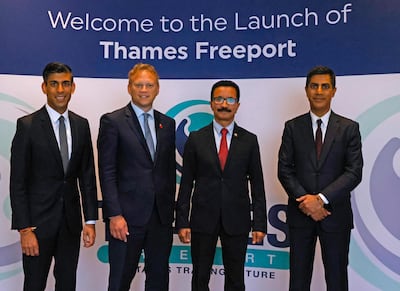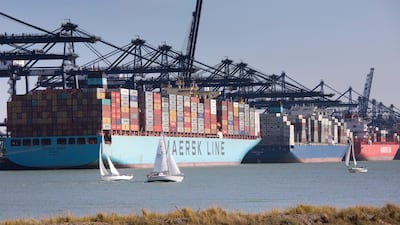The shipping industry urged the UK to back its “moon-shot” $5 billion research and development fund on Thursday, which aims to get ocean going zero-emission ships in the water by 2030 and help the sector achieve net zero by 2050.
While the British government called for net zero global shipping emissions by 2050 earlier this week, the UK has yet to back a proposal to fund the research and development of alternative zero-carbon fuels and propulsion systems to ensure that target is achievable, according to the International Chamber of Shipping.
Simon Bennett, deputy secretary general at the ICS, said the UK government needs to be asked “why they are not publicly supporting” the industry proposal, before the country hosts the Cop26 environment summit in November.
“At the moment, the UK has not had its name on that paper, despite being asked repeatedly to put its name on it. Why is that?”, Mr Bennett said, at a seminar ICS hosted to tie in with London International Shipping Week.
“Net zero is plausible, but it's only plausible if governments in co-operation with the industry, do what is required in order to make it happen. And that includes approving this research fund so that we can accelerate the technology.”
To date, the $5bn R&D fund has been backed by 10 countries, including Japan, Malta, Nigeria, Singapore, Switzerland and Denmark.
While international regulations require the global shipping industry to cut its emissions by 50 per cent compared with 2008 levels, the UK Chamber of Shipping said at the start of the week it wants the International Maritime Organisation to double this target and commit to net zero emissions by the middle of the century.
“Taking action now allows us to lead the charge on this global shift, creating highly skilled jobs for British workers and shaping the landscape for what clean shipping and trade will look like for future generations,” UK Transport Secretary Grant Shapps said earlier this week.
The government said it was pushing for absolute zero emissions, which means no offsetting and no carbon emissions, a significant increase in ambition for the sector, which is currently accountable for 3 per cent of global emissions.
The UK’s backing of a 2050 net zero target for international shipping, which transports about $14 trillion worth of goods every year, must be agreed through the IMO, the UN’s regulatory body on shipping.
This week, Mr Shapps also highlighted his ambition to have zero-emission vessels entering into commercial service by 2025.
Mr Bennett said the industry has accepted the challenge to meet the IMO's target of halving emissions by 2050.
However, “The problem at the moment is that the technology readiness levels are simply not mature enough,” he said.
ICS
“There's always announcements about exciting new developments with zero carbon ships, but realistically, it's very hard to see how we're going to have thousands of zero carbon ships appear by 2030, which given the 25-year lifespan of ships is going to be necessary if we are going to have a realistic chance of meeting that 2050 target,” he said.
Guy Platten, secretary general of the ICS, said decarbonisation is top of the agenda for every single shipping company, with the industry understanding the need to “compromise” and to do so quickly.
However, if the industry is to meet the IMO's “very challenging targets … a few things need to happen”, he said.
These include having the right zero-carbon fuels in place at scale, undertaking research and development to get the technology and readiness levels up to speed, and having a market-based measure to incentivise ship owners to move to zero carbon fuel ships and to make that transition.
ICS, which represents the world’s national shipowner associations and more than 80 per cent of the merchant fleet, first presented its submission to the UN earlier this month, calling for an internationally accepted market-based measure to accelerate the uptake and deployment of zero-carbon fuels.
The proposal, which has the backing of a number of governments as well as the wider industry, calls for all vessels trading globally above a certain size to pay a set amount per metric ton of carbon dioxide they emit.
The levy would be based on mandatory contributions by ships trading globally, exceeding 5,000 gross tonnage, for each tonne of CO2 emitted, ICS said.
While the Marshall Islands and the Solomon Islands - two nations with large shipping fleets whose territories are severely threatened by climate change - have suggested a carbon levy starting at $100 per ton, ICS said it opposed piecemeal regional measures, including one proposed by the European Commission to add shipping to the bloc's carbon market.
Instead, a global regulatory agreement is needed, said ICS, with the money generated from the levy going into a climate fund that would subsidise clean alternatives such as hydrogen until they become competitive with conventional fuels.
This would “ensure consistency in the industry’s green transition for both developed and developing economies”, the ICS said.
The $5bn R&D proposal, which is “now being supported by a wide range of governments”, will be discussed again at the IMO Marine Environment Protection Committee taking place two weeks after the Cop26 event in November.
"It is the view of the shipping industry that unless IMO member states approve this proposal at this session, it's going to be very hard to see how the goal set by IMO for 2050 is going to be met," said Mr Bennett.
“We are a global industry, and we require a global regulatory framework and what's at stake now is that IMO has a very comprehensive strategy for decarbonising the industry."
This week's London International Shipping week comes after sea freight prices have rocketed in recent months due to a global supply crunch and a shortage of vessels.
Shipping companies, buoyed by the rise in demand, are spending heavily on expanding their fleets with newly-built ships.
As a result, new shipping capacity is forecast to hit a record-matching level by 2023, according to a recent estimate from maritime brokerage Banchero Costa.
Other big announcements this week include a company developing zero-emission submarines which could transport cargo between Glasgow and Belfast being awarded a share of £23m of government green maritime funding.
The fully-automated vessels are designed to be “net positive” by running on green hydrogen and collecting microplastics, the Department for Transport (DfT) said.
A fleet could secure 27 tonnes of CO2 emissions in the first year of operation, according to the DfT.

Meanwhile, Chancellor of the Exchequer Rishi Sunak opened Britain’s first post-Brexit freeport — the UAE-backed Thames Freeport — on Wednesday, as the nation looks to boost its trade ambitions after its exit from the European Union.
The opening came as DP World said it would invest £300 million into building a fourth berth at its London Gateway port to create more capacity.
Bud Darr, executive vice president, maritime policy and government affairs at MSC Group, the second biggest cargo liner carrier in the world, said the climate change target facing the shipping industry was the “biggest challenge” the sector “will ever face".
To meet that challenge, Mr Darr said the industry must join forces with energy and supply chain providers involved in the delivery of sustainable fuels, and government intervention is needed to boost the transition, along with “support from academia to help us sort out what the solution set can look like and how to get there".
One of the biggest challenges the industry faces is “actually making the policymakers and the politicians actually understand the truly enormous scale of the challenge”, Mr Platten said.


